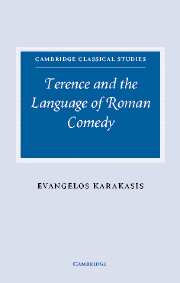Introduction
Published online by Cambridge University Press: 22 September 2009
Summary
The subject of this book is character differentiation by language in Terence and the relation of Terentian diction to the tradition of Roman comedy as a whole. It is an original study in more ways than one, since earlier studies are few in number and are often based on defective data or methodology. It is also, however, traditional, since the basic ideas at its heart are already to be found in ancient scholarship.
Ancient testimony
Ancient theorists frequently recognised the importance of selecting and using appropriate language. Aristotle, for instance, remarks on how language should differ according to age and social status (Rh. Γ. 1408a10–32). He implies that the diction put in the mouth of a slave should be different from the diction of a free citizen, and that the speech of a young man should be unlike that of an older person. It would be rather unbecoming, according to Aristotle, for a slave to use fine language. Similarly, the use of maxims and story-telling, appropriate to senile diction, would also be inappropriate in the speech of younger people. Language should differ not only according to the age and social status of the character speaking but also according to the situation or the emotional state of the speaker; this naturally leads Aristotle to the importance of suitable language for revealing the emotional state of a speaker. Compound words, clustering of epithets and unfamiliar words are, according to him, appropriate to someone who talks with emotion.
- Type
- Chapter
- Information
- Terence and the Language of Roman Comedy , pp. 1 - 18Publisher: Cambridge University PressPrint publication year: 2005

